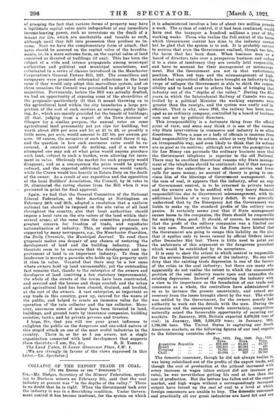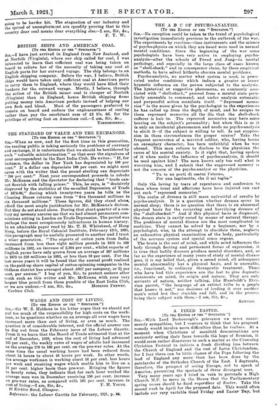COLLAPSE OF THE EXPORT TRADE IN COAL. ao THE EDITOR
or THE "SPECTATOR."] . SIR,--sMr. Hodges, Secretary of the Miners' Federation, speak- ing to Durham miners on February 5th, said that the coal industry at present was " in the depths of the valley." There is no doubt that he is right. When the Government took over the industry it was in a flourishing condition. Under Govern- ment control it has become insolvent, for the system on which it is administered involves a loss of about two million pounds a week. The system of control, if it had been continued, would have cost the taxpayer a hundred millions a year of fifty working weeks. Those who realize the full extent of the harm which Government control has done to the industry cannot but be glad that the system is to end. It is probably correct to assume that even the Government realized, though too late, the harm that has been done. When business men or a board of directors take over a prosperous business and reduce it to a state of insolvency they are usually held responsible, and have to account for their management or mismanage. meat. But the Government are not in that unfortunate position. When red tape and the mismanagement of high- minded but unpractical officials have brought an industry to the verge of collapse the Government is able to shirk the respon- sibility and to hand over to others the task of bringing that industry out of the " depths of the valley." During the fifty years in which the Intercolonial Railway of Canada was con. trolled by a political Minister the working expenses were greater than the receipts, and the system was costly and in- efficient That is why, since 1919, the railway has been man- aged as an ordinary company, controlled by a board of business men and not by political directors.
This irresponsibility- is a fortunate thing from the official point of view, and some may think it is one of the reasons why State intervention in commerce and industry is so often disastrous. When a man or a body of officials is immune from final responsibility for its actions, either is very likely to act in an irresponsible way, and even likely to think that its actions are as good as its motives; although not even the panegyrics of Sir Leo Money can persuade the ordinary business man that the Government telephone is superior to the old National. There may be excellent theoretical reasons why State.manage- merit of the telephone should be continued; but if that manage- ment gives the subscriber a less efficient service and fewer calls for more money, no amount of theory is going to con- vince him of the blessings of Government management. In the case of coal, it appears that the industry, after an orgy of Government control, is to be returned to private hands and the owners are to be saddled with very heavy financial responsibilities due to Government mismanagement, with the additional burden of a very heavy deficit. It was generally understood that by the Emergency Act the Government was liable to make up the standard profits of the colliery com- panies. It certainly seems just that if State management causes losses to the companies, the State should be responsible for making them good. It should, of course, be remembered that the profit of the colliery companies was a limited one in any case. Recent articles in the Press have hinted that the Government are going to escape this liability on the plea that it applies only to losses caused by official Orders issued after December 31st last. There is little need to point out the unfairness of this argument or the dangerous precedent which would be established by its acceptance.
It is easy to show the extent to which control is responsible for the serious financial position of the industry. No one will deny that the existing trade depression is one of the factors of the crisis in the coal industry; but there are many who apparently do not realize the extent to which the uneconomlo position of the coal industry reacts upon and intensifies the existing depression. Instead of regulating the industry with a view to its importance as the foundation of our trade and commerce as a whole, the controllers have administered it so as to increase the present uncertainty, and retard our recovery from the losses brought about by the war. The strike was settled by the Government, for the owners merely had authority to work out the details with the men. During the discussion and the consequent trade uncertainty, competitors naturally seized the favourable opportunity of securing our markets. In January, 1913, Britain exported 6,070,318 tons of coal; in January, 1920, 3,358,572 tons; in January, 1921, 1,700,106 tons. The United States is capturing our South American markets, as the following figures of our coal exports to the following countries show:—
Argentine Republic Brazil ..
Uruguay .. Chili.. • • ..
• •
Jan., 1913. Tons.
819,409 ..
139,911 ..
78,361 ..
66,004 ..
Tan., 1920. Tons.
82,361 ..
60,981 ..
29,892 967 •. . Jan., 1921. Tons. 22,757 436
. 19.306 10.769 The domestic consumer, though he did not always realize it, was being subsidized out of the profits of the export trade, and though the cost of production at the pithead increased with every increase in wages (since output did not increase pro rata), he was nevertheless getting his coal at less than the cost of production. But the bottom has fallen out of the export market, and high wages without a correspondingly increased output have forced up the cost of coal to a level at which foreign consumers are unable to buy. The domestic consumer and practically all our great industries are hard hit and are
going to be harder hit. The stagnation of our industry and the spread of unemploymsnt are speedily proving that to this country dear coal means dear everything else.—I am, Sir, &c., F. Y. W.



































 Previous page
Previous page